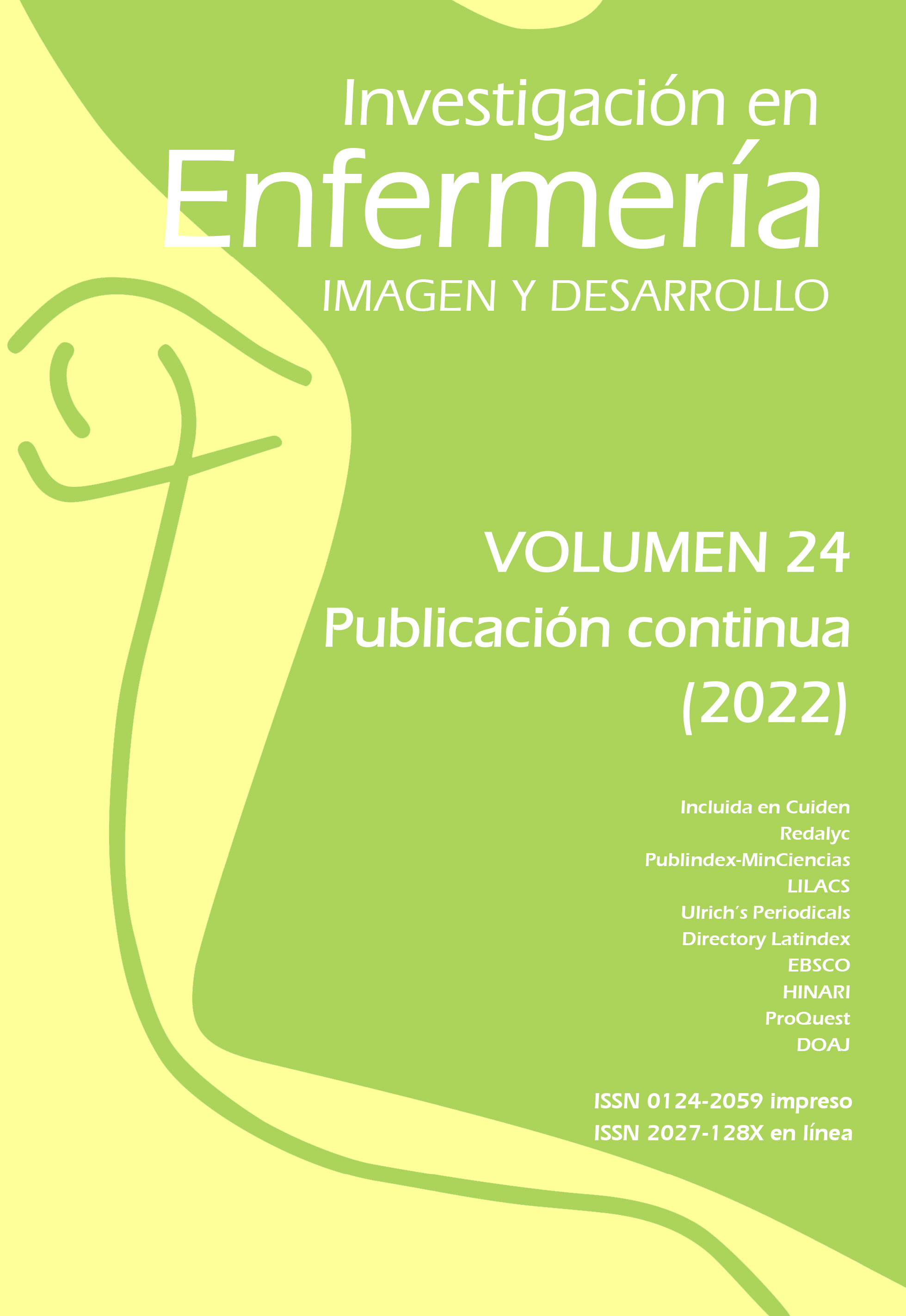Abstract
Introduction: the Informal Caregiver (IC) faces multiple difficulties in the care of the dependent person. Objectives: to assess the difficulties felt by informal caregivers in the care of the dependent person and to identify the predictive variables of these difficulties. Materials and Methods: observational, cross-sectional, descriptive-correlational study with a quantitative approach that used a non-probabilistic convenience sample of 119 IC from the Central Region of Portugal. The measurement instrument used included a sociodemographic data sheet and an Informal Caregiver Difficulties Assessment Scale (EADCI). Results: moderate difficulties were mostly observed, being higher in the dimensions of self-care and activities of daily living. The degree of functional dependence of the dependent person, the age of the IC and the existence of architectural barriers were found as predictive variables. Conclusions: the results indicate that ICs present difficulties at different levels of dependent person care, strengthening the need to implement new possible strategies to respond to these challenges.
Instituto Nacional de Estatística. Estimativas de população residente em Portugal 2018 [Internet]. Lisboa: INE;2019 [citado 2021 Jan]. Disponível em: https://www.ine.pt/xportal/xmain?xpid=INE&xpgid=ine_destaques&DESTAQUESdest_boui=354227526&DESTAQUESmodo=2
Araújo F, Martins T. Avaliação dos cuidadores: Considerações e orientações para a prática. In Martins T, Araújo F, Peixoto MJ, Machado PP, orgs. A pessoa dependente & o familiar cuidador. Porto: Escola Superior de Enfermagem do Porto; 2016. p. 113-30.
Gaviria Noreña DL. Desafios para a saúde coletiva no cuidado de indivíduos, famílias e comunidades socialmente vulneráveis em meio à pandemia. Aquichan, 2020; 20(4):e2041. doi: 10.5294/aqui.2020.2
Decreto-Lei n.º 101/2006. Cria a Rede Nacional de Cuidados Continuados Integrados [Portugal]. Diário da República, 2006 jun 6;1(109):3856-65. Disponível em: https://dre.pt/application/conteudo/353934
Administração Central do Sistema de Saúde. Rede Nacional de Cuidados Continuados Integrados: Onde estamos. Lisboa: RNCCI; 2019. Disponível em: https://www.arcgis.com/apps/PublicInformation/index.html?appid=7874a58d37a248a481d567d85be88134
World Health Organization. Dementia: a public health priority [Internet]. Geneva: World Health Organization; 2012. Disponível em: https://www.who.int/publications/i/item/dementia-a-public-health-priority
United Nations Department of Economic and Social Affairs Population Division. World population prospects: The 2017 revision. Bruxelles: United Nations; 2017. Disponível em: https://www.un.org/development/desa/publications/world-population-prospects-the-2017-revision.html
Andrade LM, Costa MD FM., Caetano JA, Soares E, Beserra EP. A problemática do cuidador familiar do portador de acidente vascular cerebral. Rev Esc Enf USP; 43(1):37-43. doi: 10.1590/S0080-62342009000100005
Van Bruggen S, Gussekloo J, Bode C, Touwen DP, Engberts DP, Blom JW. Problems experienced by informal caregivers with older care recipients with and without cognitive impairment. Home Health Care Serv Q. 2016 Jan-Mar;35(1):11-24. doi: 10.1080/01621424.2016.1145166
Páez Esteban, AN, Torres Contreras, CC, Campos de Aldana, MS, Solano Aguilar, S., Quintero Lozano, N., Chaparro Díaz, OL. Custos diretos e indiretos do cuidado de pacientes com doenças crônicas não transmissíveis. Aquichan, 2020; 20(2):e2022. doi: 10.5294/aqui.2020.20.2.2
Oldenkamp M, Bültmann U, Wittek RPM, Stolk RP, Hagedoorn M, Smidt N. Combining informal care and paid work: The use of work arrangements by working adult-child caregivers in the Netherlands. Health Soc Care Community 2018;26(1):e122-e131. doi: 10.1111/hsc.12485
Dixe MDACR, Teixeira LFC, Areosa TJTCC, Frontini RC, Peralta TJA, Querido AIF. Needs and skills of informal caregivers to care for a dependent person: A cross-sectional study. BMC Geriatr. 2019;19(1):255. doi: 10.1186/s12877-019-1274-0
Petronilho F. Preparação do regresso a casa. In Martins T, Araújo F, Peixoto MJ, Machado PP, orgs. A pessoa dependente & o familiar cuidador. Porto: Escola Superior de Enfermagem do Porto; 2016. p. 73-93.
Regulamento n.º 125/2011. Regulamento das competências específicas do enfermeiro especialista em enfermagem de reabilitação [Portugal]. Diário da República [Internet]. 2011 fev 18 [citado 2021, maio];2(35): 8658-9. Disponível em: https://www.ordemenfermeiros.pt/arquivo/legislacao/Documents/LegislacaoOE/Regulamento%20125_2011_CompetenciasEspecifEnfreabilitacao.pdf
Martins R, Rodrigues A, Andrade A, Albuquerque C, Martins C. Perception of informal caregivers on planning for the discharge of hospitalised elderly patients. Rev Rol Enf. 2018 nov-dec;41(11-12):193-7. Disponível em: http://hdl.handle.net/10400.19/5330
Matos NAM. Dificuldades do cuidador informal no cuidar da pessoa dependente [Dissertação de Mestrado da internet]. Viseu: Instituto Politécnico de Viseu, Escola Superior de Saúde de Viseu; 2019. 107 p. Disponível em: http://repositorio.ipv.pt/handle/10400.19/5478
Martins R, Santos C. Capacitação do cuidador informal: O papel dos enfermeiros no processo de gestão da doença. Gestão e Desenvolvimento 2020;(28):117-37. doi: 10.34632/gestaoedesenvolvimento.2020.9468
Costa SRD, Castro EAB. Autocuidado do cuidador familiar de adultos ou idosos dependentes após a alta hospitalar. Rev Bras Enferm. 2016, 67(6):979-86. Disponível em: http://www.scielo.br/pdf/reben/v67n6/0034-7167-reben-67-06-0979.pdf
Sequeira C. Cuidar de idosos com dependência física e mental. 2ª ed. Lisboa: Lidel; 2018. p. 110-59.
Hajek A, König HH. Informal caregiving and subjective well-being: Evidence of a population-based longitudinal study of older adults in Germany. J Am Med Dir Assoc. 2016 Apr 1;17(4):300-5. doi: 10.1016/j.jamda.2015.10.015.
Galvis-López, CR, Aponte-Garzón, LH, Pinzón-Rocha, ML. Percepção da qualidade de vida de cuidadores de pacientes atendidos em um programa de crônicas, Villavicencio, Colômbia. Aquichan.2015;16(1):104-15. Disponível em: https://aquichan.unisabana.edu.co/index.php/aquichan/article/view/4281
Oliveira M.D., Carraro TE. Cuidado em Heidegger: Uma possibilidade ontológica para a enfermagem. Rev Bras Enf. 2016;64(2):376-80. doi: 10.1590/S0034-71672011000200025
Greenwood N, Smith R. Motivations for being informal carers of people living with dementia: A systematic review of qualitative literature. BMC Geriatr. 2019 Jun 17;19(1):169. doi: 10.1186/s12877-019-1185-0

This work is licensed under a Creative Commons Attribution 4.0 International License.
Copyright (c) 2022 Investigación en Enfermería Imagen y Desarrollo



